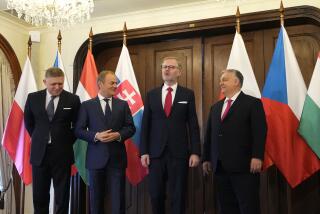East Europeans Assail Assault on Lithuania : Protests: The Soviet crackdown serves as an ominous reminder. The leaders of the new democracies seek to reassure their populations.
- Share via
BUDAPEST, Hungary — Fearful that the Kremlin is regressing to the Stalinist excesses that enslaved them for decades, East European governments on Monday denounced the Soviet crackdown in Lithuania that killed more than a dozen unarmed civilians.
“We cannot accept the military action in Lithuania. We condemn and deplore it,” Hungarian Prime Minister Jozsef Antall told a special session of Parliament convened to discuss the Soviet crisis.
The weekend assault by Red Army troops on Lithuanian nationalists in Vilnius sent shock waves through Eastern Europe, stirring painful memories of the brutal invasions that quashed earlier attempts to break free of Moscow’s tether.
Soviet troops crushed an anti-Communist uprising in Hungary in 1956 and halted democratic reforms in Czechoslovakia in 1968. Kremlin orders to the Communist regime in Poland prompted the imposition of martial law there in 1981, stifling the Solidarity trade union movement.
While leaders of the new democracies sought to assure their populations that the current reform processes are irreversible, the events in Lithuania served as an ominous reminder of the repression they only recently escaped.
Hungarian Foreign Minister Geza Jeszenszky summoned the Soviet ambassador, Ivan P. Aboimov, to demand an explanation of the order to shoot demonstrators who were trying to prevent a military takeover of the Lithuanian television station. Fourteen were killed and more than 150 wounded.
The Hungarian Red Cross announced that it was sending medical aid to Lithuania, and the Parliament sent a message to the republic’s leadership expressing solidarity with its pro-democracy cause.
Janos Herman, spokesman for the Hungarian Foreign Ministry, said Budapest was swept by “valid fears” that the Soviet leadership has slipped back into the Bolshevist practice of using military might to prevent erosion of its political power.
In Czechoslovakia, victim of the last Soviet aggression in Eastern Europe, when Kremlin troops and tanks crushed the “Prague Spring” reform movement, officials warned Moscow that its deadly intervention in Lithuania might prompt an accelerated breakup of the Warsaw Pact defense alliance.
The 35-year-old military bloc is already effectively defunct, but the five remaining East European states had indicated they would stave off official dissolution until the end of this year.
Joint planning and maneuvers ceased last year, but the Warsaw Pact has been overseeing the unfinished business of Soviet troop retreats from the regions the Kremlin dominated until the revolutions of 1989.
“The government is highly disturbed that the armed aggression of the Soviet army against the Lithuanian people occurred at the moment when the attention of the entire world is focused on the joint activities against Iraqi aggression,” Czechoslovak Foreign Minister Jiri Dienstbier said in Prague.
More to Read
Sign up for Essential California
The most important California stories and recommendations in your inbox every morning.
You may occasionally receive promotional content from the Los Angeles Times.














